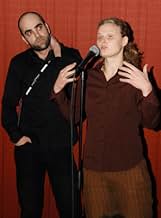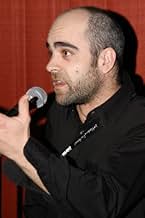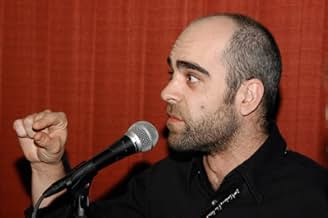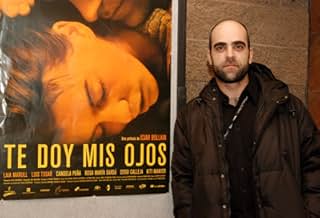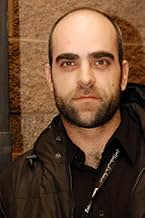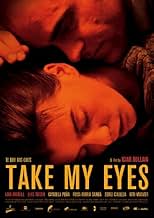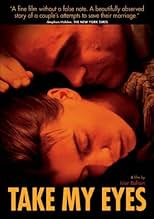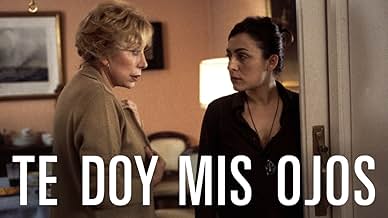AVALIAÇÃO DA IMDb
7,4/10
7,8 mil
SUA AVALIAÇÃO
Adicionar um enredo no seu idiomaOne winter night, Pilar runs away from home. With her, she takes only a few belongings and her son, Juan. Antonio soon sets out to look for her. He says Pilar is his sunshine, and what's mor... Ler tudoOne winter night, Pilar runs away from home. With her, she takes only a few belongings and her son, Juan. Antonio soon sets out to look for her. He says Pilar is his sunshine, and what's more, "She gave him her eyes"...One winter night, Pilar runs away from home. With her, she takes only a few belongings and her son, Juan. Antonio soon sets out to look for her. He says Pilar is his sunshine, and what's more, "She gave him her eyes"...
- Prêmios
- 42 vitórias e 17 indicações no total
Rosa Maria Sardà
- Aurora
- (as Rosa María Sardá)
Kiti Mánver
- Rosa
- (as Kiti Manver)
David Mooney
- John
- (as Dave Mooney)
- Direção
- Roteiristas
- Elenco e equipe completos
- Produção, bilheteria e muito mais no IMDbPro
Avaliações em destaque
From beginning to end this movie is a sea of tension, mostly generated by Pilar's (Laia Marull) stunning fear gestures, and by Antonio's (Luis Tosar) volatile state, leaving the spectators breathing heavily in awe.
With great performances by the entire cast, a solid and incredibly realistic script, an amazing score, and shot in the beautiful town of Toledo, this production grabs you right from the start. Even when the story isn't as disturbing as 'Once Were Warriors (1994)' the characters develop a three dimensional presence to the point of being as complex as a real couple in a self-destructive relationship creating such a drama, that tends to be more psychological than physical.
And even when the conclusion does not represent a drastic overcome, it stands as an example of courage and self determination that will, in deed, prevail in the mind of the viewer, and even more in those who find themselves in the same situation as the protagonist. Kudos to Miss Bollain, this is a good movie, be sure not to miss it.
With great performances by the entire cast, a solid and incredibly realistic script, an amazing score, and shot in the beautiful town of Toledo, this production grabs you right from the start. Even when the story isn't as disturbing as 'Once Were Warriors (1994)' the characters develop a three dimensional presence to the point of being as complex as a real couple in a self-destructive relationship creating such a drama, that tends to be more psychological than physical.
And even when the conclusion does not represent a drastic overcome, it stands as an example of courage and self determination that will, in deed, prevail in the mind of the viewer, and even more in those who find themselves in the same situation as the protagonist. Kudos to Miss Bollain, this is a good movie, be sure not to miss it.
Writer-director Iciar Bollaín's film, TAKE MY EYES (Spain 2003) is full of boldness and nuance, approaching 'full frontal' (almost a pun here) the delicate 'taboo' subject on spouse abuse in love and marriage. The exceptionally talented and selfless portrayal of the couple by Laia Marull as Pilar (the young wife/mother) and Luis Tosa as Antonio (the husband/abuser) made their scenes together - both the tender moments and violent events, convincing and complete. It's heartbreaking to see these two people who could be so in love (felt through the intimate lovemaking scenes, the calm moments they enjoy each other by the river) yet juxtaposed by the traumatic turn of events (seen through the 'explosive' frightful situations). Bollaín, with Marull and Tosa, did not shy away from the volatile subject and key scenes - it is no doubt devastating to behold yet the impact of the situation is truly felt and may also leave us shaking. Kudos to such giving and fearless performances and production decisions.
The Toledo, Spain, locales (especially by the river and bridge) seen in the film are as beautiful as I visited in Fall 2003. I remember the museum where Antonio waited outside for Pilar. He tried. He wanted to be a loving husband to her, but he couldn't help himself. It almost seem like uncontrollable 'alcoholic dependency', his jealous rage generated from fear of losing Pilar, whom he believes he loves in his own possessive ways. While Pilar also tries. She practically loses herself in trying to please Antonio and be 'blinded' by his waves of tenderness towards her. She's struggling to be a good wife and responsible mother to their little boy. She's also trying to find herself through the process.
I recall the wisdom from poet Kahlil Gibran's book "The Prophet" on Marriage: yes, you shall be together forever more, but there should be spaces in your togetherness. "Give your hearts, but not into each other's keeping. For only the hand of Life can contain your hearts." And on Love, that it does not possesses, Gibran said: "And think not you can direct the course of love, for love, if it finds you worthy, directs your course."
TAKE MY EYES gives us a rare chance to observe closely the various aspects/perspectives of a domestic violence situation, and offering viable option on the part of the woman. It may not be an easy film to watch due to frank emotional depiction, but it is superbly delivered by a fantastic cast besides Marull and Tosa. The script, co-written by Bollaín and Alicia Luna, contains supporting storyline (including a wedding and Scottish bagpipes and kilts - cultural diversity, girl talk, men talk, laughs and heartaches). Production is excellent in every respect: cinematography, editing, art direction, music score, sound and all. Highly recommend this film, with no hesitation.
The Toledo, Spain, locales (especially by the river and bridge) seen in the film are as beautiful as I visited in Fall 2003. I remember the museum where Antonio waited outside for Pilar. He tried. He wanted to be a loving husband to her, but he couldn't help himself. It almost seem like uncontrollable 'alcoholic dependency', his jealous rage generated from fear of losing Pilar, whom he believes he loves in his own possessive ways. While Pilar also tries. She practically loses herself in trying to please Antonio and be 'blinded' by his waves of tenderness towards her. She's struggling to be a good wife and responsible mother to their little boy. She's also trying to find herself through the process.
I recall the wisdom from poet Kahlil Gibran's book "The Prophet" on Marriage: yes, you shall be together forever more, but there should be spaces in your togetherness. "Give your hearts, but not into each other's keeping. For only the hand of Life can contain your hearts." And on Love, that it does not possesses, Gibran said: "And think not you can direct the course of love, for love, if it finds you worthy, directs your course."
TAKE MY EYES gives us a rare chance to observe closely the various aspects/perspectives of a domestic violence situation, and offering viable option on the part of the woman. It may not be an easy film to watch due to frank emotional depiction, but it is superbly delivered by a fantastic cast besides Marull and Tosa. The script, co-written by Bollaín and Alicia Luna, contains supporting storyline (including a wedding and Scottish bagpipes and kilts - cultural diversity, girl talk, men talk, laughs and heartaches). Production is excellent in every respect: cinematography, editing, art direction, music score, sound and all. Highly recommend this film, with no hesitation.
This movie takes a brutally honest approach at the tragic reality of spousal abuse. This topic has been addressed before, but this movie deals with the subject matter better than any other I can recall seeing.
An effective performance by Luis Tosar, as the abusive husband Antonio, develops the layers of emotions in this imposing and frightening character in an effort to understand why this violence is occurring. While certainly not presenting an advocate's position to defend his cruel and vicious behavior, the film also resists the temptation of exploiting the volatile outbreaks. The film shows degrading speech and physical battery to the wife, while not going overboard with bloody, gory attack just for their own sake. He attends support groups to discuss with a psychologist and other abusers the root causes of the action, and makes a sincere effort to change his ways. Gradually, the motivations for his irrational action, although becoming clearly understood, are still properly advanced as totally unacceptable.
Laia Marull, as the abused wife, is not stereotyped, either. She is shown as an intelligent and capable person, making an honest effort to confront the situation, while struggling with the conflict of somehow preserving the marriage. There are many artistic metaphors about the passion of their marriage reflecting the very problem they are dealing with. I also like the wife's museum tour presentations, where she is clearly talking not only of the paintings, but of her own aspirations. Both of the principals are splendid in their roles, especially in their interaction with one another.
Much could be written of the rich double-layered symbolism of several other scenes. Suffice it to say this is a beautifully done movie with an ending, that in all its simplicity, took me by surprise. It was the proper ending, too, I think, for reasons you will understand when you see the movie. Definitely worth viewing.
An effective performance by Luis Tosar, as the abusive husband Antonio, develops the layers of emotions in this imposing and frightening character in an effort to understand why this violence is occurring. While certainly not presenting an advocate's position to defend his cruel and vicious behavior, the film also resists the temptation of exploiting the volatile outbreaks. The film shows degrading speech and physical battery to the wife, while not going overboard with bloody, gory attack just for their own sake. He attends support groups to discuss with a psychologist and other abusers the root causes of the action, and makes a sincere effort to change his ways. Gradually, the motivations for his irrational action, although becoming clearly understood, are still properly advanced as totally unacceptable.
Laia Marull, as the abused wife, is not stereotyped, either. She is shown as an intelligent and capable person, making an honest effort to confront the situation, while struggling with the conflict of somehow preserving the marriage. There are many artistic metaphors about the passion of their marriage reflecting the very problem they are dealing with. I also like the wife's museum tour presentations, where she is clearly talking not only of the paintings, but of her own aspirations. Both of the principals are splendid in their roles, especially in their interaction with one another.
Much could be written of the rich double-layered symbolism of several other scenes. Suffice it to say this is a beautifully done movie with an ending, that in all its simplicity, took me by surprise. It was the proper ending, too, I think, for reasons you will understand when you see the movie. Definitely worth viewing.
This is an excellent movie that understands the complexity of domestic violence. I am an advocate for survivors of domestic violence and we know that partner abuse is much more than a black eye. During the movie there is only one episode of physical violence, however we can observe throughout the movie the dynamics of power and control by the husband, through emotional, verbal, and other types of abuse. The person who wrote the previous message shows a complete lack of understanding about the impact that domestic violence has on the victim, why it is so difficult to break with cycle, the challenges that women face when they try to leave (including the fear of retaliation). Don't forget that 75% of women killed by their partners were murdered after they left the relationship. By leaving, women are taking a great risk. I think this movie is very realistic and the actors do a great job. I highly recommend it.
I've already seen this film twice and the subsequent viewing has not diminished much director Iciar Bollain's powerful treatment of domestic violence. In fact, I was actually reluctant to see it again because its potent portrayal of spousal abuse was too disturbing.
There are two things notable about this film that make it stand out from other films on the same subject. One is that it features almost no violence. In fact, there is only one full-blown case of abuse portrayed, and it is less about physical abuse than it is humiliation and emotional abuse.
Another is the nuanced portrayal of the abusive husband. For this, credit must go to actor Luis Tosar, who portrays Antonio. Although the film does its best to give a more balanced portrayal by showing that Antonio does go to therapy and makes some attempt to change his ways, it is Tosar's performance that brings out his human side.
It would have been easy for Tosar to have demonized Antonio, particularly since the actor already a scary appearance, what with his bushy eyebrows and deep-set eyes. But Tosar chooses to take the high road in his performance, focusing on Antonio's deep-seated insecurity and inferiority complex, which are the roots of his violence towards his wife.
His most notable scene is the last one in the film when his wife finally leaves him. As she and her friends go around the apartment packing up her things, the expression on his face is not one of anger but of incomprehension.
But equal credit should be given to Laia Marull, who portrays the wife, Pilar. Because of her performance, the filmmakers literally do not have to show much violence. The literally palpable fear she shows when Antonio is about to go into once of his rages makes that unnecessary.
The film also shows the sexual bond between Pilar and Antonio in order to explain why she continues to return to him despite his abusive behavior, through a frank sex scene that would be possible only in Europe, since American movie makers seem averse to that kind of frankness.
Te doy mis ojos is difficult to watch at times, because of the intensity of its emotional violence. But it is ultimately rewarding for the insights it gives on spousal abuse and the relationship between abusive husband and abused wife.
There are two things notable about this film that make it stand out from other films on the same subject. One is that it features almost no violence. In fact, there is only one full-blown case of abuse portrayed, and it is less about physical abuse than it is humiliation and emotional abuse.
Another is the nuanced portrayal of the abusive husband. For this, credit must go to actor Luis Tosar, who portrays Antonio. Although the film does its best to give a more balanced portrayal by showing that Antonio does go to therapy and makes some attempt to change his ways, it is Tosar's performance that brings out his human side.
It would have been easy for Tosar to have demonized Antonio, particularly since the actor already a scary appearance, what with his bushy eyebrows and deep-set eyes. But Tosar chooses to take the high road in his performance, focusing on Antonio's deep-seated insecurity and inferiority complex, which are the roots of his violence towards his wife.
His most notable scene is the last one in the film when his wife finally leaves him. As she and her friends go around the apartment packing up her things, the expression on his face is not one of anger but of incomprehension.
But equal credit should be given to Laia Marull, who portrays the wife, Pilar. Because of her performance, the filmmakers literally do not have to show much violence. The literally palpable fear she shows when Antonio is about to go into once of his rages makes that unnecessary.
The film also shows the sexual bond between Pilar and Antonio in order to explain why she continues to return to him despite his abusive behavior, through a frank sex scene that would be possible only in Europe, since American movie makers seem averse to that kind of frankness.
Te doy mis ojos is difficult to watch at times, because of the intensity of its emotional violence. But it is ultimately rewarding for the insights it gives on spousal abuse and the relationship between abusive husband and abused wife.
Você sabia?
- CuriosidadesLaia Marull said her role in this film is the one that has marked her career the most. "It was a very intense movie. I remember the scene in which my character is undressed by his partner and urinates on the balcony. It was a very emotional scene. Working with Luis Tosar is very easy because you look into his eyes and he gives you everything," Marull said. For his part, Tosar revealed a secret about that scene: "When we filmed the scene on the balcony, in which she pees on herself out of fear, I remember being with a sponge between her legs, helping her squeeze it so that the trickle would fall out."
- ConexõesReferenced in Todo Mundo Hispânico (2009)
- Trilhas sonorasFarewell To Gibraltar
Canción popular escocesa
Principais escolhas
Faça login para avaliar e ver a lista de recomendações personalizadas
- How long is Take My Eyes?Fornecido pela Alexa
Detalhes
- Data de lançamento
- País de origem
- Central de atendimento oficial
- Idioma
- Também conhecido como
- Leve Meus Olhos
- Locações de filme
- Empresas de produção
- Consulte mais créditos da empresa na IMDbPro
Bilheteria
- Faturamento bruto nos EUA e Canadá
- US$ 30.496
- Fim de semana de estreia nos EUA e Canadá
- US$ 6.440
- 19 de mar. de 2006
- Faturamento bruto mundial
- US$ 6.098.633
- Tempo de duração1 hora 49 minutos
- Cor
- Mixagem de som
- Proporção
- 1.85 : 1
Contribua para esta página
Sugerir uma alteração ou adicionar conteúdo ausente

![Tráiler [OVS]](https://m.media-amazon.com/images/M/MV5BNDFiNzRhYTMtODVmNy00OWQ0LTkwMzAtYjRiNGZmNTk4YjhhXkEyXkFqcGdeQXRyYW5zY29kZS13b3JrZmxvdw@@._V1_QL75_UX500_CR0)
